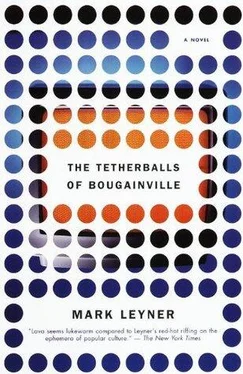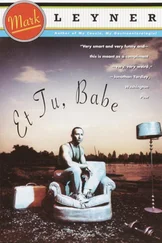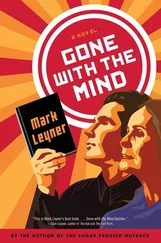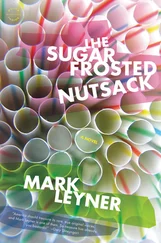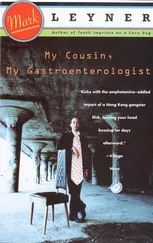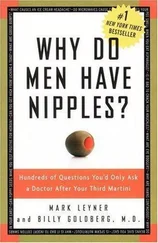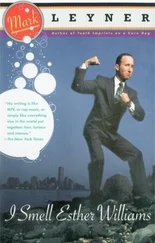“ ‘That summer, Lens parents take him on a vacation to Wiseguyana.
“ ‘Hundreds of years ago, Mafia turncoats — mobsters who’d “rolled over” and testified for the prosecution — were put into the federal witness protection program and exiled to an isolated region of a country on the northern coast of South America — what is today called Wiseguyana. And over the generations, as the ex-Mafiosi interbred with the indigenous population, they gradually devolved into a primitive tribe of hunter-gatherers. And although today they depend on very basic means of sustaining themselves — spears, blowguns with curare-tipped darts, and manioc cultivation — they retain a number of cultural vestiges of their forebears. They wear loincloths made from their ancestors’ $3,000 double-breasted Brioni suits, for instance. And the shaman keeps the tribe’s sacred amulets in the last surviving monogrammed sheer Gucci sock. But this culture’s fascinating lineage is most conspicuous in its speech patterns and idioms. Here’s a young hunter as he trusses a wounded tapir in the moonlit forest: “You don’t stay still, I’m gonna whack you in the fuckin’ mouth, you scumbag. I don’t need this shit. You think I enjoy this? I could be at the track or with some broad, but no, I’m here so you can break my fuckin’ balls? You piece of shit, nocturnal, ungulate cocksucker.” Here’s the tribal headman, a wizened elder in feather headdress and ornamental earsticks, pacing in front of his palm-thatch clubhouse, concerned about the outcome of the tapir hunt: “I send this bum out for tapir … this Johnny Butterass, Johnny Blowjob, whatever the fuck his name is. Where the hell is he? I’m like a fish in the desert here, for Christsake! I gotta read the New York Post to find out how he fuckin’ made out? I hate this [inaudible] with a fucking passion!”
“ ‘After two weeks of boogie-boarding, snorkeling, golf, and sight-seeing in Wiseguyana, the Gutmans are in a taxi on the highway en route to the airport and little sunburnt Len sees a billboard at the Convention Center that reads: “Due to Plane Crash, Buddy Holly, Richie Valens, The Big Bopper, Patsy Cline, Jim Croce, and Lynyrd Skynyrd Will Not Be Appearing Tonight.” Now, not only should this be an extremely compelling scene because of how powerfully it will resonate in the audience’s collective memory of that ill-fated flight, which was piloted by 7-year-old novice aviatrix Jessica Dubrofif, but in terms of the plot, this is the pivotal scene in the entire movie. This is the precise moment at which young Leonard Gutman realizes his almost mystical affinity for signage copywriting. From that moment on, Gutman studies and rewrites every single marquee, billboard, and sign he encounters.
“ ‘And, basically, the rest of the movie deals with his teenage years, which are uneventful except for an uncharacteristic, albeit tragic, indiscretion; his long, illustrious career and unparalleled accomplishments and awards; and finally his controversial death at the hands of New Jersey cardiologist and Tae Kwon Do black belt Dr. Richard Cuozzo.
“ ‘Obviously I see you, Colonel, playing Gutman, but I also thought — and tell me if this sounds crazy — that maybe you could play Cuozzo, too — y’know, do a sort of Alec Guinness in Kind Hearts and Coronets , multiple-role, tour-de-force thing.
“ ‘So, what do you think?’
“Alebua grins broadly.
“ ‘I think it could be huge,’ he says, greenlighting the project on the spot.
“But Mark is desperately worried, of course, that he won’t be able to actually write the screenplay.”
“One day in his trailer on the lot, he meets Polo.
“Polo — who’s come in to interview for a position as a dialogue writer — is a completely hairless, chain-smoking Bonobo chimpanzee. Shipped, as an infant, from a research facility in Kinshasa, Congo, to a biomedical laboratory in Bougainville, where he spent much of his adult life, Polo is cross-hatched with vivisection scars, his health ravaged by pharmaceutical experimentation. But he’s been taught a vast and erudite vocabulary of sign language by the researchers who abandoned him when they fled Bougainville’s civil war. Melancholic, physically decrepit, squinting through the smoke of a ubiquitous cigarette, Polo is a sort of simian Dennis Potter.
“With Mark serving primarily as Polo’s amanuensis and occasional junior writing partner, they complete the script for Gutman in less than a week. This becomes the first of scores of movies that they write, direct, and produce for the Colonel. (These are perhaps less ‘movies’ than the ultimate product inserts — Alebua being the product, of course.) It’s common for security guards, passing by Mark’s trailer late at night, to see through the window the glowing ember of Polo’s cigarette tracing irregular shapes in the darkness as he signs, with Mark struggling to keep pace with his shorthand. The studio becomes a huge, thriving enterprise, employing the finest actors, actresses, Stuntmen, cinematographers, choreographers, grips, gaffers, and best boys in Melanesia.
“In addition to their working partnership, Polo and Mark develop a close personal relationship. Polo exhibits a keen sensitivity to Mark’s conflicted feelings about his missing, NJSDE-releasee father. Grateful for the empathic companionship, Mark keeps a Louis XIV porcelain candy box (with zaftig shepherdesses cavorting on the lids) continuously stocked with panda nuts, sugarcane, and sun-dried termites for his dissipated, four-foot confidant/mentor, and makes sure that he has the latest downloaded issues of German and Turkish pornography specializing in explicit photos of estrous female Bonobos.
“In addition to screenplays, Polo ‘writes’ novels. Same modus operandi: Polo signs, Mark takes dictation, offering the odd emendation and bon mot. Polo has an astonishing capacity to write proficiently in any style — techno-suspense, New Age inspirational, Sadean transgression, high lyricism, faux-naif ebonic, slacker confessional, magic realism, cut-up, avant pop, trailer-park minimalism, neo-gothic southern, you name it. And his novelistic output is prolific — some sixteen novels so far, ranging in length from several hundred pages to over a thousand.
“One afternoon, Polo and Mark decide to fabricate noms de plume for their novels by making anagrams out of the surnames of Bougainvillean tetherball players. Determining it wise to avoid the better-known players like Offramp Tavanipupu, Wuwu-Bulolo Puliyasi, and Onguglo To’uluwa, they select the last names of minor-league players who appear in the back-page box scores of that day’s sports section: Mafuta Mel’Chachanibo, Yamabola Trantando, Udang Gascand-Pupulolo, Waso Libré-El’Fennjé, Moses Nirrshinca’olo, Paza Christifebro, Ushaga Eresed-Yeffé’Jingu, Hazu Tonnra-N’JenFhaza, Bonabuzo Tsirinamma, Ng’ombé Tandizüjo, Elijah Tetsi-Lélé’Bona, Sr., Mühür Nampinsomso, Xavier Tergheepo, Ali Falla’d-Certdevi-Waso, Ozzy Emshamo, and Satmak L. L.’Herbé-Tetziwuza.
“This is an extremely long scene, during which a coffee-guzzling, Liquid Paper-huffing Polo and Mark endeavor long into the night, endlessly rearranging and re-rearranging letters in order to anagrammatize the players’ surnames into appropriately authorial-sounding pseudonyms. By early morning, Mel’Chachanibo has been transposed into ‘Michael Chabon.’ Tranttando has eventually been worked into ‘Donna Tartt.’ Gascand-Pupulolo is anagrammatically reshuffled into ‘Douglas Coupland.’ Libré-El’Fennjé becomes ‘Jennifer Belle.’ Nirrshinca’olo becomes ‘Colin Harrison.’ Christifebro—‘Tibor Fischer.’ Eresed-Yeffé’Jingu—‘Jeffrey Eugenides.’ Tonnra-N’JenFhaza—‘Jonathan Franzen.’ Tsirinamma—‘Martin Amis.’ Tandizüjo—‘Junot Díaz.’ Tetsi-Lélé’Bona Sr. — ‘Bret Easton Ellis.’ Nampinsomso—‘Mona Simpson.’ And Tergheepo—‘Peter Hoeg.’ Some of the concocted pen names go through scores of iterations before a suitably literary sounding version is achieved. Falla’d-Certdevi-Waso provisionally becomes ‘Darlesca “Lew” D’Fatvio’ before ‘David Foster Wallace’ is deemed more urbane. Emshamo is ‘Amos Hem’ before one last reshuffling into ‘A. M. Homes.’ And Mark and Polo almost settle on ‘Walter Huzzbeitle’ as the final anagrammatical product of L. L.’Herbé-Tetziwuza, before several more reconfigurations yield ‘Elizabeth Wurtzel.’
Читать дальше
